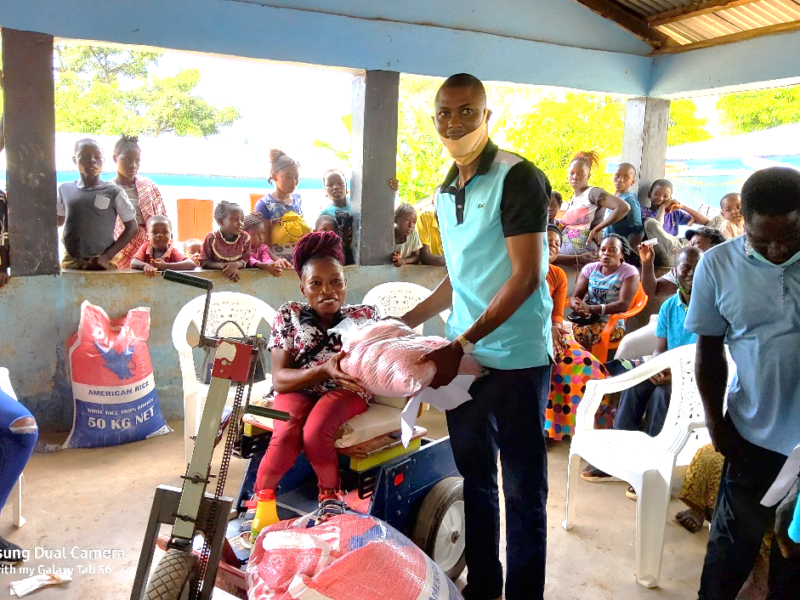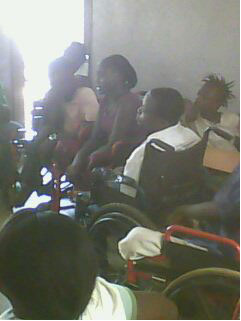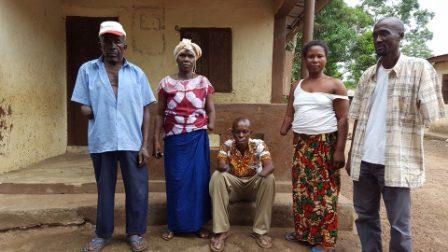When Will Their Voices Be Heard?
A picture keeps coming to my mind. It’s a picture of our Sierra Leonean compatriots who have resorted to finding their survival on the streets of Freetown and other big towns and cities. They sit, stand and/or walk all over the place. They beg for survival. They beg anybody and everybody who comes their way. They are mostly persons with disabilities. Did I say only persons with disabilities are begging at present? Certainly, they are not. Begging has taken many forms and shapes. People have resorted to different methods of begging. They ask for money to complete their transport fare, to go to the hospital, to buy medical drugs for their children or relatives, to pay college and school fees, to buy food and so on and so forth. Those who beg at present include the poor and the impoverished, the educated and the uneducated; the employed and the unemployed, and the intelligent and the unintelligent. Don’t be quick to dismiss them. Some of them are just ‘genuine beggars.’ They live on daily handouts from those who have the heart, the will and the means to give. I particularly draw your attention to those who perform their ‘trade- begging’ around the Cotton Tree, the Law Courts Building, and the Bank of Sierra Leone in the central business district of Freetown.
Does anything come to your mind when you pass through the Law Courts Building and the Bank of Sierra Leone with beggars moving helter-skelter around almost all sides of those buildings? Am sure you do. I do also. Anytime I come across the beggars around those buildings, I see a picture of a country where most of those who are supposed to serve the suffering masses have resorted to only seek their selfish interests and desires. The beggars sit, stand and walk in front of two key offices- the Law Courts Building housing the Judiciary of Sierra Leone and the Bank of Sierra Leone. They are sending one clear message- “We suffer from extreme poverty.”
Chapter Eight of the Constitution of Sierra Leone, Act No. 6 of 1991 deals with the Judiciary. Section 120 (1) provides that “The Judicial power of Sierra Leone shall be vested in the Judiciary of which the Chief Justice shall be the Head.” Sub-section 2 of Section 120 further provides that “The Judiciary shall have jurisdiction in all matters civil and criminal including matters relating to this Constitution, and such other matters in respect of which Parliament may by or under an Act of Parliament confer jurisdiction on the Judiciary.” In my view, one of those matters relating to the Constitution which the judiciary has jurisdiction over is contained in Section 7 (1) (a) and (b). Notwithstanding the issue of the said section not being justiciable, it provides that “The State shall within the context of the ideals and objectives for which provisions are made in this Constitution— a. harness all the natural resources of the nation to promote national prosperity and an efficient, dynamic and self-reliant economy; b. manage and control the national economy in such a manner as to secure the maximum welfare and freedom of every citizen on the basis of social justice and equality of opportunity; ….” The State in my view has not secured the maximum welfare and freedom of every citizen on the basis of social justice. There is almost no equality of opportunity. The poor continue to be poor, while the rich continue to get rich. The country has gone to a point in which few people enjoy the resources of the state. The national wealth is in the hands of few people, albeit illegally. What is sad is the fact that the house of justice which should deal with the corrupt has not done enough. The state of poverty some people are in today is as a result of their property which somebody has deprived them of. There are cases in court about land, houses and other property that have been there for as long as God knows when. The people have used their resources to get justice to the extent of losing everything they had to get justice. Justice, there is none. Resources, they have lost. The final result is poverty. The state in which some of the traditional beggars and the ‘beggars by circumstances’ found themselves today is also not unconnected to some extent to the unaccountable way the country’s resources were and are being managed and utilised. If the resources were available, the government might have put in place polices and programmes that could have taken at least most of the beggars off the streets. I submit that the mere sight of the beggars within the precincts of the Law Courts Building should make the men and women of justice deal with those who squander the resources of the State. The Chief Justice should also see the plight of the beggars as a reason that should propel her to continue to provide justice by holding the corrupt to account.
The Bank of Sierra Leone (BSL) which is the central bank of Sierra Leone, among other things, formulates and implements monetary policies. BSL says it mission is to “formulate and implement monetary and supervisory policies to foster a sound economic and financial environment….” The Bank of Sierra Leone Act, 2011 in Section 7 (2) (b) provides that the Bank shall “act as banker, adviser and fiscal agent of the Government.” This is all I and other well meaning Sierra Leoneans are asking for. Please Mr. Bank Governor advise the government to utilise and implement sound policies that would foster economic growth. I ask that you see the presence of beggars all around your buildings as a fundamental reason why you should make a case to the government to ensure that the ‘Consolidated Fund’ gives the beggars their own share of the country’s national resources.
I argue that the two institutions should see the beggars as representatives of the suffering masses of Sierra Leone. Don’t tell me their voices are not loud enough. Don’t tell me they have not shouted enough. For me, the question is, when will the government hear their case? Will the government ever listen to and act on their case? Don’t tell me it’s a no-case submission. They have a case. Their presence on the streets of Freetown and other places is a clear indication of the case they are making. They are making a case on the massive state of poverty they continue to live in and they are subjected to. The case of the beggars is symptomatic of the state many Sierra Leoneans are in today. Without waiting for Statistics Sierra Leone to give us figures, be they real, imaginary or concocted, it is a fact that poverty is here with us. The President’s message in the Agenda for Prosperity points out that “…whilst we have reduced poverty from 66.4 percent in 2003 to 52.9 percent in 2011, we need to do more…” ‘A Poverty Profile for Sierra Leone’ courtesy of the Sierra Leone Integrated Household Surveys (SLIHS) of 2003 and 2011 also notes that “nationally, poverty has decreased from 66.4 to 52.9 percent between 2003 and 2011 – a reduction of more than 10 percent.” I am a researcher. I like quantitative research and the corresponding analyses, but sometimes we try to match figures with facts on the ground. Talking about reduction of poverty by 13.5 percent, if the figures in the Agenda for Prosperity are anything to go by, then we need to see the reflection on the lives of people. Like Theo Nicol, current Deputy Minister of Information and Communications would say during the days both of us served as panellists on ‘Inside the Media’ programme on SLBC/TV, “We are talking about bread and butter issues.” Addressing the issue of poverty by rhetoric is good, if you like, but the reality is better.
But anyway, we may take solace in the fact that our ‘Agenda for Prosperity- Road to Middle Income Status has got a ‘vision’ for Sierra Leone in 2035 that specifically speaks to the issue of poverty. It states that by 2035, Sierra Leone aspires to be an inclusive, green, middle-income country with “Over 80% of the population above the poverty line.” We will only pray that the vision becomes a reality. Like the Biblical adage goes, “Though it (the vision) tarries, it shall surely come to pass.”
While we wait for that vision to come to pass, the beggars continue to sit, stand and walk in front of the institution that keeps the government’s money, but yet they live in abject poverty. They also sit, stand and walk in front of the building in which people are supposed to get justice, but yet they suffer from injustice. They are like Lazarus who will go into a palace but would only long to eat what fell from the rich man’s table. In the case of the beggars, I am not sure they are even eating from what falls from the rich man’s table. Our own rich men, who like the rich man in the Bible, are dressed in purple and fine linen are not even like their friend who will give little to the beggar, Lazarus. In fact those of us who have little are the ones sharing the little with the poor.
In all of these, the people of Sierra Leone are asking media practitioners to do just one thing; to play their watchdog and/attack dog role in society. I believe they are not asking for too much. The media in Sierra Leone can help the Anti-Corruption Commission to hold the corrupt to account. But that is all they can do. Those who are charged with the responsibility of prosecuting, convicting and sentencing the corrupt must do their work effectively and efficiently. The country, like the media, is never as poor as some people want others to believe. It is a question of the ‘national cake’ that has not been distributed equally and fairly. Is it a case of people living in poverty in an area of prosperity? I hope not.
By Francis Sowa
Francis Sowa is a journalist/social and media analyst and lecturer, Mass Communication Department, Fourah Bay College, University of Sierra Leone (fsowa2007@yahoo.com, +232 76 866 519/ +232 77 866 569)
Stay with Sierra Express Media, for your trusted place in news!
© 2013, https:. All rights reserved.





